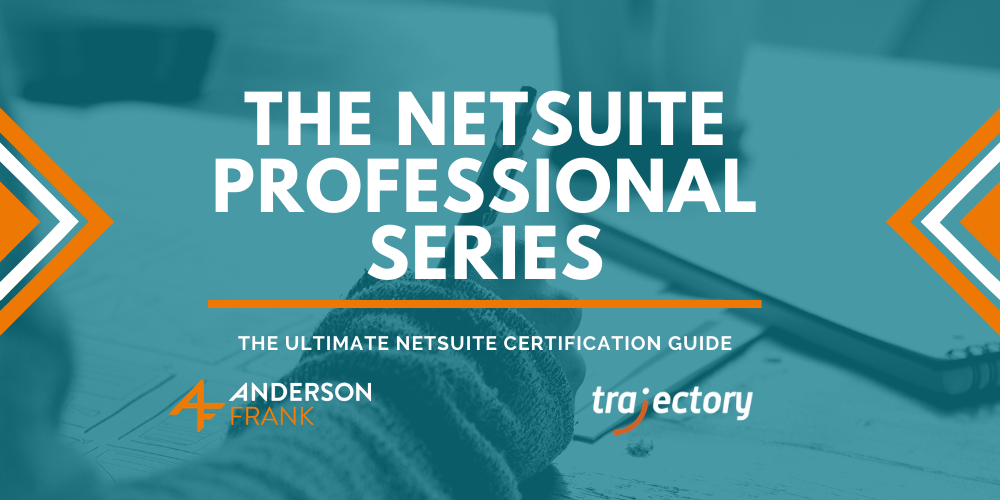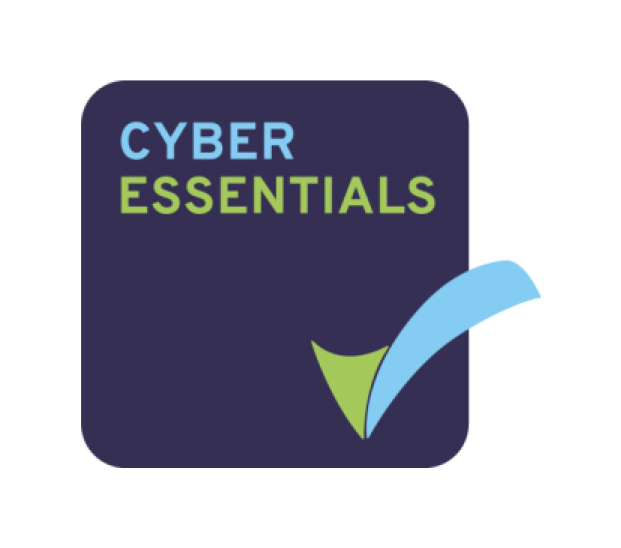
We’ve teamed up with the NetSuite Solution Provider Trajectory Inc to work on a series of articles based on the life of a NetSuite professional. Watch out for their article on fixed assets in NetSuite. But first, let’s dive into today’s topic: The ultimate guide to NetSuite certifications and exam prep.
The NetSuite professional series so far:
- The roles and responsibilities of a NetSuite Admin
- NetSuite tools – the SuiteCloud platform
- NetSuite OneWorld – an Admin guide
- Retraining as a NetSuite Admin: 4 things you need to know
- 6 secrets to climbing the NetSuite career ladder
- Quote to cash | order management system
- 8 must-have NetSuite apps for a happier team
- 9 steps to a NetSuite implementation team
- NetSuite CSV import | ERP data migration process
- How much should you be earning as a NetSuite Admin?
- Oracle NetSuite security roles
- How to write a killer NetSuite resume
- 12 frequently asked questions in a NetSuite interview
- NetSuite Fixed Assets Module: what, how & why
It pays to be NetSuite certified
Holding a NetSuite certification provides many benefits. Not only do you enter an elite NetSuite professional network, but you can also increase your career opportunities. The recent edition of our Salary Survey found that 68% of NetSuite professionals hold a certification, a 66% increase from last year’s report. With nine out of 10 companies asking for qualifications in their job specifications, it’s clear that holding certifications is becoming imperative.
Whether you’re a developer, administrator, or a NetSuite customer, there are six different qualifications available to help grow your understanding of the NetSuite ecosystem. The certifications are also a great indicator to potential employers that you have the experience, dedication, and technical know-how to drive their organization forward.
75% of businesses pay for their employee’s NetSuite certification, and over 50% of those employees stated they saw an increase in their salary after gaining a qualification.
To understand the benefit of being NetSuite certified, download our free independent report on the NetSuite ecosystem.

Anderson Frank’s NetSuite Market Trends and Salary Survey takes a comprehensive look at salaries across all NetSuite positions and explores workplace benefits and factors that influence job satisfaction, as well as industry trends, giving you the most up-to-date and comprehensive snapshot of the NetSuite community available anywhere.
The NetSuite certifications cover six disciplines:
NetSuite Certified SuiteFoundation
The SuiteFoundation NetSuite certification is for NetSuite professionals who can already use the NetSuite product and have a basic understanding of its core concepts and features.
The test covers subjects such as:
- Company and user preferences
- Customization options of the NetSuite user interface
- Features and standard modules
- Dashboards, reports, and searches
- The NetSuite product release process
- Relationships among users, roles, and permissions
- Standard record types and how they are structured
There’s a variety of additional courses that NetSuite recommends if you are interested in the SuiteFoundation certification, such as:
- NetSuite Certification: SuiteFoundation exam preparation
- NetSuite essentials SuiteAnalytics
- Financial reports and searches
The 80-minute exam consists of 66 multiple-choice and matching questions. If you’re a NetSuite professional looking to take this course, you should have between three to six months’ experience administering NetSuite before taking the test.
The NetSuite Certified SuiteFoundation is an essential piece of the NetSuite development jigsaw, and you need the certification to complete the other certifications NetSuite offers.
Before taking the exam, NetSuite has provided sample tests with questions that ask you to define and identify how you would complete a task. There are six specific subject areas covered in the test: setup and administration, NetSuite user interface, standard NetSuite process flows, SuiteAnalytics and maintenance, resources, and data security.
NetSuite Certified Administrator
If you’re looking to take the NetSuite Certified Administrator exam, you’ll need at least one year of experience configuring and executing a robust NetSuite implementation project. You should also have the ability to manage an application to a standard that meets a company’s needs and hold a SuiteFoundation qualification.
Certified Administrators need to be familiar with:
- SuiteAnalytics
- SuiteBuilder
- SuiteCloud platform
- Setup and administration
- Data security
Recommended courses for the NetSuite Administrator certification include:
- NetSuite essentials
- SuiteAnalytics: reports and searches
- SuiteAnalytics: advanced searches
- SuiteFlow: workflow fundamentals
- SuiteCloud: exploring the NetSuite platform
Ready to take your NetSuite admin career to the next level?
Check out what roles are available on our job board.
NetSuite Certified ERP Consultant
To gain an ERP consultant certification, you’ll need the equivalent experience of performing five to 10 medium-scale, or two to three enterprise-size NetSuite ERP implementations; roughly equivalent to two years’ worth of NetSuite consultant-related roles.
The certification covers five subjects: analytics, data strategy, ERP, OneWorld, and platform. You have two hours to complete the 80 multiple-choice and matching questions. If you are a consultant, implementation project team member, or a business analyst who has helped implement NetSuite into a business, we recommend taking part in NetSuite’s study sessions.
The two-day intensive course focuses on ERP capabilities and platform capabilities. The course is run by experts in the field who review all key subject areas while answering your questions about NetSuite’s features and abilities by using case studies.
With lectures, study materials and a NetSuite demo account, you’ll be able to prepare thoroughly for your NetSuite ERP Consultant exam. During the two days, the experts will teach you all you need to know in selected subject areas. These include NetSuite ERP, NetSuite OneWorld, item records and inventory management, SuiteCloud Platform, and creating a data strategy via data migration and structure.
There are also free training webinars available with practical tips and tricks to help you use NetSuite better.
Looking for great NetSuite consultancy jobs?
Check out what roles are available on our job board.
NetSuite Certified SuiteCloud Developer
The SuiteCloud Developer certification also requires two examinations: the SuiteFoundation exam and the two-hour long SuiteCloud Developer exam.
Those pursuing this certification are expected to have between one and two years’ experience working with SuiteCloud technologies, as well as two to three years of software development experience. It’s also beneficial to know JavaScript, SQL, SOAP, XML, JSON, and REST technologies.
The exam covers:
- SuiteAnalytics
- SuiteFlow
- SuiteTalk
- SuiteBundler
- SuiteBuilder
- SuiteScript
- Design fundamentals
Before you attempt to become a certified SuiteCloud developer, the company recommends attending seven pre-courses, including the five mentioned in the NetSuite Administrator course. As well as this, NetSuite recommends attending the five-day SuiteScript 2.0: Extend NetSuite with Javascript course. This will teach you the skills and practices necessary to create and deploy many script types while using the software.
The objective of the course is to show you how to automate data entry on forms, standard sublists, and sublists created from custom record types. You’ll learn to schedule automated processes, extend the power of workflows through action scripts, build custom portlets and applications, and learn to use debugging tools to help troubleshoot your scripts.
The SuiteCloud Developer preparation course is the final pre-course requisite before sitting the test. With the help of previous case studies, you will be guided through the crucial topics that will apply to the real exam’s seven subject areas. You can complete this course over two days.
NetSuite Certified SuiteCloud Developer II
In August 2018, NetSuite introduced the SuiteCloud Developer II certification as a replacement for the original (now called SuiteCloud Developer I). The main reason for the upgrade was to replace the SuiteScript 1.0 section of the exam with SuiteScript 2.0 objectives, in addition to doing a general update of the exam’s content.
NetSuite retired the SuiteCloud Developer I certification in January 2019. For those who have taken the retired exam, NetSuite confirmed it is still a valid qualification, and you will not have to upgrade to SuiteCloud Developer II. Instead, they recommend you continue to take the annual new release quiz to ensure you’re skilled in the latest updates and new products. However, if you have not taken the retired exam before, you will only have access to sit the SuiteCloud Developer II certification, after you have completed the SuiteFoundation exam.
NetSuite SuiteCommerce Developer certification
Unlike other qualifications, the SuiteCommerce Developer Certification only requires a single exam.
Areas covered in the exam include:
- SuiteCloud
- APIs and services
- SuiteCommerce advanced applications
- Account configuration and set up
- Design fundamentals
In the SuiteCloud section, you will identify the impact of execution context for scripts and the webstore, as well as demonstrate how a .ss and .ssp are used for a commerce application. In addition, you’ll need to know how to create and install bundle types, identify the importance of global libraries in SSP applications, how a scriptable cart is used; and finally, the purpose of touchpoints in an SSP application.
In the API and services section of the exam, you will have selected tasks to demonstrate your understanding. One task includes a scenario about the Commerce API in which you must identify the code snippet required to achieve the result you need. You will also have a commerce scenario in which you must distinguish the proper fieldset setup for the Search API. You will have various other situations to showcase your skillset throughout the section.
Preparing for your NetSuite SuiteCommerce Developer certification exam
Here are some areas that often come up in the SuiteCommerce Advanced applications section.
You must identify characteristics of a single-page application and be able to show how to bootstrap data on an initial page load, including user-specific and site data. You’ll also need to identify templates that follow SCA best practices and reveal how you would expose data from views to templates.
For the account configuration and set-up topic, you will need to prove you can configure URL components, shipping items, and payment methods, while also being able to recognize NetSuite’s functionality and recommended practices that are related to credit card data. Finally, to pass the design fundamentals section of the exam, it’s likely you’ll have to locate the place of transaction types in a standard lead-to-cash and returns workflow. While these tips don’t explain every point that may come up on your test, NetSuite offers you a full exam study guide.
Those wishing to pursue this certification should have one to two years’ experience of working with all relevant SuiteCommerce technologies, and two to three years of related web development experience. It’s also beneficial to have a basic knowledge of SuiteScript, JavaScript, JSON, HTML, and CSS.
The exam is a live proctored examination, although online proctoring is also available. You are given two hours to complete the test, which consists of 77 multiple-choice and matching questions, but you are not allowed to refer to any written or online content during the test. The exam specification is rewritten by NetSuite every three to four years, meaning that successful candidates need to retake the test at the end of this period if they want to maintain their certification.
The best NetSuite developer jobs on the market.
Check out what roles are available on our job board.
NetSuite Certified Financial User
The NetSuite Financial User course provides foundational knowledge to navigate around the NetSuite system and understand core NetSuite accounting and finance functionality.
The exam topic areas include:
- Subsidiaries
- Classifications and chart of accounts
- Accounts payable
- Accounts receivable
- Billing schedules
- Banking and payment processing
- Journal entries
- Budgeting
- Expense allocations
- Financial reports and KPIs
- Period and year-end close
Recommended training includes the NetSuite: Finance Fundamentals course and at least three months of experience in accounting or finance roles. You are allocated 60 minutes to complete the exam, which consists of 30 multiple-choice and matching questions. You will have to do a follow-up test in the future if you are looking to keep the qualification live, the policy for this is available via NetSuite’s certification webpage.
NetSuite Certified SuiteAnalytics User
The Certified SuiteAnalytics User exam will enable you to gain the foundational knowledge and skills to understand and use the searches, reports, and dashboard features of NetSuite. To be qualified to take this exam you should have six months of experience building searches and reports on the NetSuite dashboard.
The exam topics include:
Reports and Searches
- Identifying the best way to aggregate data result
- Comparing the methods of sharing search results vs. reports
- Recognize the impact of audience, access, and role restrictions on data results
- Identify steps to incorporate parent/child records in a saved search
- Understand various methods of publishing and updating dashboards
- Compare dashboard elements to address user requirements
- Identify necessary setting to create a KPI Scorecard
Report Builder
- Identify the use of the financial report builder interface
- Recognize when a scenario requires the alternate data/ period range feature
- Identify which user requirements are better met with a custom search vs. a customer report
Advanced Searches
- Recognize the impact of mainline on transaction search results
- Understand which record to use as the basis of a search to yield the desired result
- Identify features used for formatting search results
- Recognize the difference between formulas in custom search vs. in report
- Recognize which SQL expressions will yield desired search results: CASE, DECODE, TO_CHAR, INSTR, SUBSTR, NVL, NULLIF, and a criteria formula.
Recommended training courses include SuiteAnalytics: reports and searches, financial reports and searches, and advanced searches. You are allocated 60 minutes to complete the exam, which consists of 30 multiple-choice and matching questions. You will need to take a future follow-up test to ensure you keep the qualification live, and the policy for this is available via NetSuite’s certification webpage.
Annual NetSuite release quiz
At the end of every financial year’s quarter three, NetSuite issues a free online annual release quiz to verify the ecosystem’s awareness of the two software updates they had that year. If you passed any of their exams earlier than January 1st of the same year, you’re required to take the latest release quiz to maintain ‘current’ certification status, which you can do on the NetSuite website.
Questions will be multiple-choice, multi-select, or matching. All questions are based upon that year’s release notes, which we recommend you review the release notes ahead of taking the quiz.
11 training resources that will help you become a NetSuite superstar
How much do NetSuite certifications cost?
For more information about how to obtain NetSuite certifications and for an up-to-date schedule for examinations, visit the NetSuite website.
After becoming certified, you are likely to accelerate your career. One benefit for an individual who holds a NetSuite certificate is that it gains you access to a closed LinkedIn community of other individuals to give you the chance to network with your peers.
To keep your certifications current, you need to pass an annual update on your subject, which includes a quiz to verify your awareness of any new features that have been released. As well as this, you need to sit a refresher exam every three to four years, which includes a written examination so you can validate your knowledge.
Once you have completed your course, you should contact NetSuite and allow up to two weeks for confirmation to arrive alongside its related benefits. While passing the exams won’t entitle you to place a logo on your company’s website, it does allow your employer to state how many individuals within the organization are currently certified.



